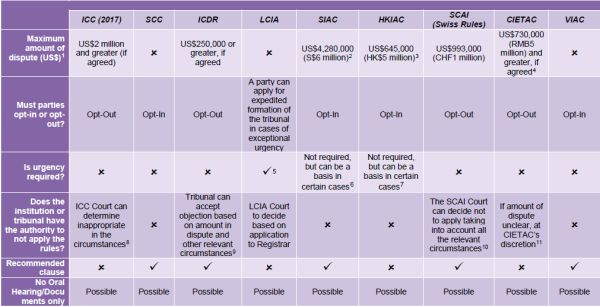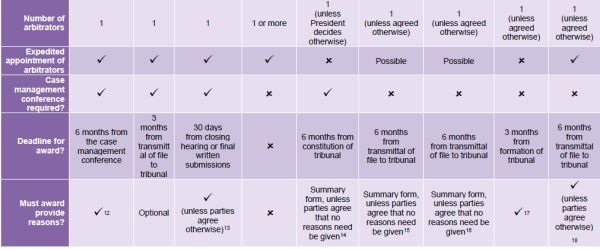The International Chamber of Commerce ("ICC") has revised its arbitration rules ("ICC Rules") effective 1 March 2017. The 2017 updates are not as comprehensive as the revision of the ICC Rules in 2012, but are intended to further increase efficiency and transparency. As discussed below, the most noteworthy change is the introduction of "Expedited Procedure Rules" for smaller claims.
Section I summarizes the ICC's new Expedited Procedure Rules. Section II discusses other changes to the ICC Rules, including amendments intended to make it easier for the ICC Court to communicate decisions relating to the tribunal's formation and relating to the Terms of Reference. Section III compares the ICC's new Expedited Procedure Rules to the expedited procedures available under the rules of a number of other arbitral institutions and Appendix A is a chart comparing institutional rules on expedited procedures.
While the revised ICC Rules will apply to arbitrations commenced after 1 March 2017 irrespective of the date of conclusion of the arbitration agreement, the new Expedited Procedure Rules will only apply to arbitration proceedings based on arbitration agreements concluded after 1 March 2017, i.e., after the Expedited Procedure Rules enter into force (Article 30(3)(a)).
I. New ICC Expedited Procedure Rules for Smaller Claims (Article 30 and Appendix VI)
The most significant change made in the revised ICC Rules is the introduction of an option for parties to use a new expedited procedure (the Expedited Procedure Rules are set out in Article 30 and Appendix VI to the ICC Rules). As described below, the Expedited Procedure Rules will apply to any case where the claims do not exceed US$2 million (unless the parties "opt-out" by agreeing that those rules will not apply (Article 30(3)(b))). Parties can also agree to apply the Expedited Procedure Rules to cases with amounts in dispute that exceed US$2 million (Article 30(2)(b)).
Where an arbitration proceeds pursuant to the Expedited Procedure Rules, it will be heard by a sole arbitrator. This is true "notwithstanding any contrary provision of the arbitration agreement." The sole arbitrator will be nominated by the parties within a time limit fixed by the ICC Court's Secretariat or, failing such nomination, appointed as soon as possible by the ICC Court itself (Appendix VI, Article 2).
Once the sole arbitrator is confirmed, he or she will not be required to draw up Terms of Reference (Appendix VI, Article 3(1)), and the parties may not raise new claims unless the tribunal so authorizes (Appendix VI, Article 3(2)). In addition, the sole arbitrator must convene a case management conference within fifteen days of receiving the file (unless the ICC Court extends this time limit pursuant to a reasoned request from the tribunal or on its own initiative), and must render a final award within six months of that conference (Appendix VI, Articles 3(3) and 4(1)).
Under the Expedited Procedure Rules, the sole arbitrator is accorded considerable discretion to adopt the procedural measures he or she considers appropriate. The sole arbitrator may, for example, limit the parties' document production, witness evidence, and written submissions (Appendix VI, Article 3(4)). Likewise, the sole arbitrator may conduct what the ICC refers to as a "distance" hearing (e.g., by videoconference), or dispense with a hearing entirely and decide on the basis of documents only (Appendix VI, Article 3(5)). Although tribunals have a similar degree of discretion under the standard ICC Rules, the provisions in the Expedited Procedure Rules are intended to encourage active case management to ensure efficiency.
Before the tribunal is constituted, a party may make a request to the ICC Court to determine that it is inappropriate to apply the Expedited Procedure Rules to the case (Article 30(3)(c)). The ICC Court also may, on its own motion or upon the request of a party, and after consulting with the tribunal and the parties, decide at any time during the proceedings that the Expedited Procedure Rules shall no longer apply to a case (Article 30(3)(c) and Appendix VI, Article (1)(4)).
II. Other Revisions to the ICC Rules
There are a number of other revisions to the ICC Rules that come into force on 1 March 2017. These are summarized below.
- Communication of Decisions Relating
to the Tribunal's Formation (Article 11(4))
- Under Article 11(4) of the 2012 ICC Rules, when the ICC Court decided on the appointment, confirmation, challenge, or replacement of an arbitrator, it was not authorized to communicate to the parties its reasons for such decisions unless all the parties had consented beforehand.
- The 2017 update amends Article 11(4). From 1 March 2017, the ICC Court may communicate reasoning for its decisions on the appointment, confirmation, challenge or replacement of an arbitrator. This is intended to provide increased transparency and more closely aligns the ICC with other leading arbitration rules (although certain institutions, such as SCAI and CIETAC, still provide that reasons will not be given for decisions resolving arbitrator challenges).
- Amendments Relating to the Terms of
Reference and Jurisdictional Objections
- The 2017 update reduces the time allotted for drawing up the Terms of Reference. Under the 2012 ICC Rules, the tribunal had 60 days to draw up the Terms of Reference after receiving the file. Under the 2017 revision, a tribunal must finalize the Terms of Reference "[w]ithin 30 days of the date on which the file has been transmitted to it," although this may be extended at the tribunal's request or on the ICC Court's own initiative (Article 23(2)).
- Under the 2017 update, a tribunal may to proceed to hear the parties' claims or counterclaims as long as the entirety of the requisite advance on costs on those claims or counterclaims have been paid (Appendix III, Article 1(3)). In the past, even where the parties had paid the advance on costs in full, a tribunal could not proceed with the hearing until it had also finalized the Terms of Reference and the procedural timetable.
- Under both the 2012 and 2017 Rules, the tribunal is entitled to decide whether an arbitration may proceed when the existence, validity, or scope of the arbitration agreement has been challenged. The text of the 2012 ICC Rules only referred to such challenges being brought by the respondent. The 2017 update clarifies that "any party" to the arbitration (including additional parties) can raise such challenges.
- Schedule of Fees
- Finally, the ICC has updated its schedule of fees. It has applied its updated schedule to all cases from 1 January 2017. In addition to increasing the non-refundable filing fee to US$5,000 (Appendix III, Article 1), the ICC's sliding scale for administrative expenses and arbitrator fees has also been updated (Appendix III, Article 4).
- The schedule of fees for cases under the Expedited Procedure Rules (which come into force on 1 March 2017 at the same time as the updated ICC Rules) will use the same scale of costs for administrative expenses, but with reduced arbitrator fees (Appendix III, Article 3).
A full copy of the updated rules can be viewed here: http://www.iccwbo.org/Data/Documents/Business-Services/Dispute-Resolution- Services/Arbitration/Arbitration-Rules/ICC-Rules-of-Arbitration-2017-Revision/.
III. Comparison of the New ICC Expedited Procedure Rules with Expedited Procedures Under Other Institutional Rules
With the 2017 revisions, the ICC joins a number of other arbitral institutions that have express provisions for expedited proceedings. The similarities and differences between the approaches taken by the ICC and a number of other leading institutions (including the SCC, ICDR, LCIA, SIAC, HKIAC, SCAI, CIETAC and VIAC) are summarized below and in the table at Appendix A.
- Amount in Dispute: The ICC's Expedited Procedure Rules automatically apply to cases where the amount in dispute does not exceed US$2 million. Some institutions (e.g., the SCC, SIAC, and VIAC) apply expedited procedures to disputes greater than US$2 million (in equivalent US$ as set out in the table), but those institutions only apply their expedited procedures where the parties have specifically "opted in" to those expedited procedures. When compared with only those institutional rules that apply expedited procedures by default, the ICC's procedures apply to disputes involving amounts in dispute that are two to three times greater than those of other institutions where the rules apply automatically (e.g., the ICDR, SCAI and CIETAC). The SIAC and HKIAC also provide that a party may apply for proceedings to be conducted in accordance with their expedited procedures "in cases of exceptional urgency," even in cases that exceed the defined amount in dispute for expedited cases.
- Requirement of Urgency: Like most other institutions with expedited procedures, the ICC does not require that there be a showing of urgency or emergency for its Expedited Procedure Rules to apply. As noted, some institutions, such as the SIAC and HKIAC, provide that their expedited rules can apply in cases of exceptional urgency even where the amount in dispute is higher than the amount for expedited cases, but do not require urgency for cases under the specified amount in dispute. The LCIA does not have detailed rules for expedited proceedings, but does provide that a party can apply to the LCIA Court for the expedited formation of the tribunal "in the case of exceptional urgency."
- Recommended Clause: Unlike a number of other institutions, the ICC does not provide a recommended clause specifically for proceedings to be conducted under Expedited Procedures.
- Number of Arbitrators: The ICC's Expedited Procedure Rules are similar to most other rules in providing that cases can be decided by a sole arbitrator (whose appointment may also be expedited). However, unlike a number of other institutions, the ICC Rules do not provide the parties with the option of having more than one arbitrator. Rather, the ICC Rules provide that, for cases falling under the expedited rules, a sole arbitrator will be appointed even where the parties have agreed otherwise (similar provisions are included in SCC and ICDR Rules). In contrast, the ICDR, SIAC, HKIAC, CIETAC and SCAI rules allow a multiple-member tribunal to be appointed in an expedited case either by party agreement or by the decision of the institution.
- Case Management Conference: A number of institutions, including the ICC (as well as the SCC, ICDR and SIAC) require that a case management conference be held for expedited cases. This requirement is consistent with the approach for any arbitration under those institutions' rules. In contrast, institutions that do not generally require a case management conference (such as the HKIAC, SCAI, CIETAC, and VIAC) also do not do so for expedited cases.
- No Oral Hearing/Documents Only: Like other expedited rules, the ICC Rules give the tribunal the discretion to dispense with an oral hearing and decide a case on the basis of documents only. As with other institutions, the ICC Rules do not provide a standard as to when such an approach is appropriate.
- Discontinuing Expedited Procedures: Under the ICC Rules, the ICC Court is entitled to decide at any stage of the proceedings, either on its own motion or upon the request of a party and after consultation with the tribunal and the parties, that the Expedited Procedure Rules will no longer apply to that case. A few institutions (e.g., the ICDR and SIAC) expressly provide that a party can object to application of the expedited procedures. However, most institutions do not expressly address whether the application of expedited procedures may be objected to or discontinued after they have been applied.
- Timing of Award: The ICC Expedited Procedure Rules require an award to be rendered within six months of the case management conference (which in turn must take place with 15 days of the appointment of the arbitrator) unless extended by the ICC Court. In contrast, under most other expedited rules, the time limit for rendering an award is usually calculated from the date of the tribunal being constituted or receiving the file (generally the award must be rendered in three or six months from that date). One exception to this approach is the ICDR, which provides that the award must be rendered within 30 days of the closing hearing or of final written submissions.
- Reasoned Award: The ICC Expedited Procedure Rules require that an award must be reasoned. In contrast, most other expedited rules allow for an award to be in summary form unless the parties have specifically agreed otherwise (CIETAC also requires that an award in an expedited case must be reasoned).
Appendix A (below) summarizes the requirements and expedited procedures under a number of leading institutional arbitration rules.


Footnotes
1 Currency conversions made on 27 February 2017.
2 If the amount in dispute exceeds this amount, a party may apply for an expedited procedure in cases of "exceptional urgency." See SIAC Rules, Article 5.1(c).
3 If the amount in dispute exceeds this amount, a party may apply for an expedited procedure in cases of "exceptional urgency." See HKIAC Rules, Article 41.1(c).
4 If amount in dispute is unclear, CIETAC has the discretion to apply the expedited rules, depending on, inter alia, the complexity and interests involved. See CIETAC Rules, Article 56(2).
5 See LCIA Rules, Article 9A (providing for expedited appointment of tribunal in "the case of exceptional urgency").
6 See SIAC Rules, Rule 5.1(c) (providing that expedited proceedings may be applied in urgent cases regardless of parties' agreement or amount in dispute).
7 See HKIAC Rules, Article 41.1(c) (providing that expedited proceedings may be applied in urgent cases regardless of parties' agreement or amount in dispute).
8 See 2017 ICC Rules, Article 30(3).
9 See ICDR Rules, Article E-4.
10 See SCAI Rules, Article 42(2).
11 See CIETAC Rules, Article 56(2).
12 See 2017 ICC Rules, Article 32(2) and Appendix VI(1).
13 See ICDR Rules, Articles 30(1), E-1 and E-10.
14 See SIAC Rules, Rule 5.2(e).
15 See HKIAC Rules, Article 41.2(g).
16 See SAIC Rules, Article 42(1)(e).
17 See CIETAC Rules, Articles 49(3) and 64.
18 See VIAC Rules, Articles 36(1) and 45(2).
The content of this article is intended to provide a general guide to the subject matter. Specialist advice should be sought about your specific circumstances.



